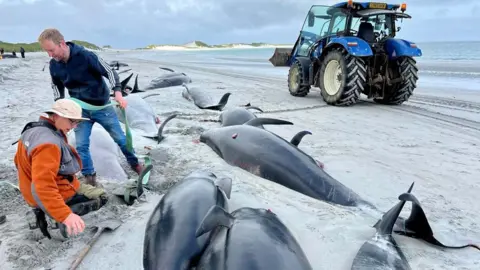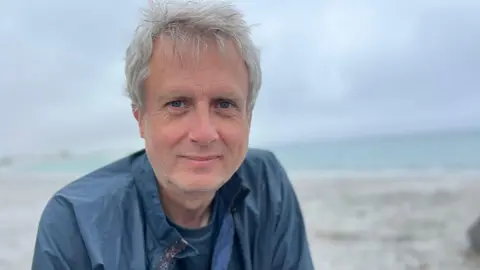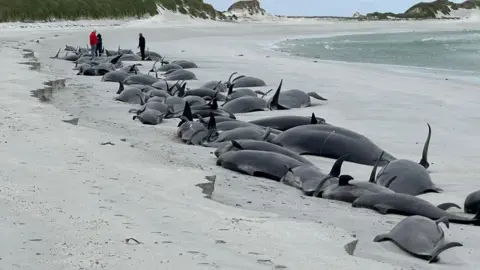Through Ashley Keenan-Brice and Rob Flett, bbc scotland information
Professionals from across the United Kingdom have arrived in Orkney to examine and perform post-mortems on 77 pilot whales which died after being washed ashore.
The animals were discovered on Sande Island on Thursday after the largest accumulation of strandings in almost 100 years.
Cetacean consultants – who have experience in aquatic mammals – will take tissue samples to determine the cause of stranding.
Nick Davison, stranding co-ordinator for the Scottish Marine Animals Stranding Scheme (SMASS), said the group had selected four female pilot whales for examination postmortem.
Due to the size of the trapped animals, these tests will be conducted on some, not all, animals.
Contributors to the society are being requested to avoid the section.

Pilot whales are social animals and reside in a matriarchal style social construct The oldest female may be seen as the authority within the pod.
Mr Davison said that by analyzing the females, the group could find out what might have caused the stranding and also give more information about how the whales lived.
He said: “It’s often a process of elimination.
“Our struggle here is to really figure out what put them over the edge, whether it’s a problem or not or whether it’s a thing that we executed or not.”
Using samples taken from whales, scientists can rule out disease, entanglement, ear damage from sonar, and interactions with predators.
Mr Davison said the process of examining the whale could last three or four days.

Emma Neave-Webb, of the British Divers Marine Life Rescue (BDMLR) charity, said removing the animals was a “huge effort”.
He said BBC Radio’s Good Morning Scotland program That the investigation would be a “major multi-agency effort”.
The pod included male whales up to seven meters (22 ft) long, as well as females, calves and juveniles.
Ms Neave-Webb said she felt helpless and emotional after visiting the site and seeing the scale of those trapped.
She said: “I’ve seen this kind of thing before globally as a stranding incident, but I’ve never experienced it personally with so many animals lying on a beach.
“The animals were packed very closely with live animals next to dead animals – they were moving around quite a bit, sometimes wagging their tails so it was a really dangerous situation.”

BDMLR medics were brought in from mainland Orkney and Inverness to assist in the rescue, although Ms Neave-Webb said it appeared the whales had been stranded for “a considerable time”.
Rescuers tried to keep the whales alive by pouring seawater on them, but it was later decided to euthanize them.
After heavy rain overnight, Ms Neave-Webb said one of the key animals was now partially buried in sand, posing an additional problem in reaching them.
Scientists from the Zoological Population of London (ZSL) are expected to arrive in Orkney on Saturday to allow the group to carry out further tests.
The Stranding’s website has gone dry to gain entry and Ms Neave-Webb paid tribute to Sanday locals who have provided shipping using 4 through 4 cars.
“The community and everyone around has really pulled together to help.” He said
“We’ve got some local farmers on hand with tractors and trailers to help us. They’ve been absolutely fantastic. They’re working with the council at the moment to work out where these animals will go.”
A spokesperson for Orkney Islands Council said discussions were ongoing with public representatives on how to dispose of the bodies.
He said: “In previous situations where whales have washed up on our shores and subsequently died, our environmental health team’s approach to body disposal has been to allow nature to take its course – by asking the public to stay away from the area. Advice has been given.
“Our assessment in this case, given the size and potential social health implications, is that additional special action will need to be taken, for example burying them where they are or moving the bodies to a mass grave site. In other places.”
BBC News understands that Orkney Islands Council will decide on Saturday how to handle the remains, with burial “the most likely possibility”.
It is believed to be the largest implicated case in the UK since 1927, when 126 of more than 130 False killer whale dies in Dornoch Firth in the highlands
closing week a An entire pod of 55 pilot whales Lewis died after being trapped.
Discover more from news2source
Subscribe to get the latest posts sent to your email.





